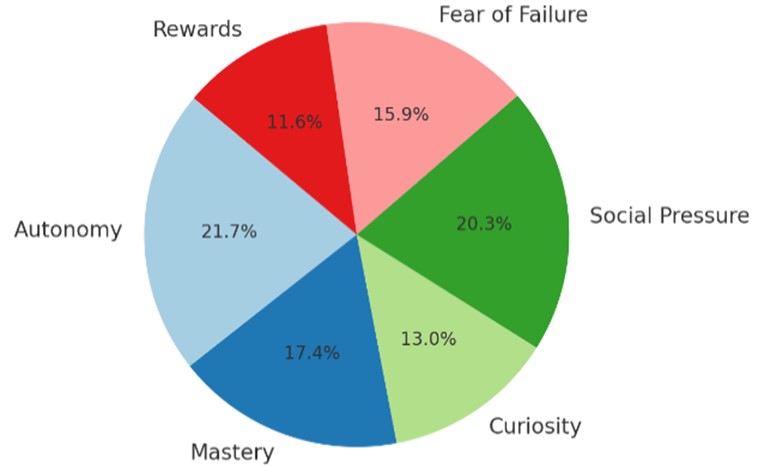Linguistic Markers of Motivation in Pakistani Higher Education: A Mixed-Methods Psycholinguistic Study of Intrinsic and Extrinsic Orientation
Abstract
This mixed-methods study explores the intrinsic and extrinsic motivations of undergraduate students in a public-sector university in Karachi, Pakistan. Grounded in Self-Determination Theory (SDT), this study investigates the influence of internal and external motivational factors on student engagement and academic performance. Quantitative data were collected from 120 students using validated scales that measured intrinsic motivation, extrinsic motivation, and belief in motivation, with GPA serving as an indicator of academic performance. Qualitative data were gathered through semi-structured interviews with 20 students and analysed using Braun and Clarke's six-phase thematic analysis. Three major motivational patterns emerged: intrinsic, extrinsic, and mixed/conflicted motivation. Students driven by intrinsic factors emphasised autonomy, mastery, and curiosity. In contrast, extrinsically motivated students revealed pressures from family, fear of failure, and a desire for rewards. A third group demonstrated mixed motivation, torn between personal interest and social expectations — a dynamic shaped by Pakistan's collectivist educational culture. Cronbach's alpha results showed high reliability for all measurement scales (α > .85). Integration of linguistic cues in the qualitative data further revealed distinct language patterns used by each motivational group. The study's findings have implications for higher education policy, suggesting that motivation-enhancing interventions must be culturally informed and student-centred. Emphasising autonomy and reducing externally imposed pressure may improve long-term academic outcomes.
References
Ahmad, R., Rahman, S., & Zafar, M. (2022). Parental expectations and extrinsic motivation in South Asian higher education. Pakistan Journal of Educational Research, 5(2), 44–59.
Al-Harthy, I. S., Was, C. A., & Isaacson, R. M. (2022). Gender differences in academic motivation among Gulf students. Educational Psychology, 42(3), 214–230. https://doi.org/10.1080/01443410.2021.1973049
Arshad, N., & Malik, R. (2023). AI-assisted learning and student motivation in Pakistani universities. Technology in Education Journal, 4(2), 76–88.
Bandura, A. (1997). Self-efficacy: The exercise of control. W. H. Freeman.
Bashir, S., & Batool, I. (2021). Parental pressure and academic stress: A motivational analysis. Pakistan Journal of Psychological Research, 36(3), 521–540.
Braun, V., & Clarke, V. (2006). Using thematic analysis in psychology. Qualitative Research in Psychology, 3(2), 77–101. https://doi.org/10.1191/1478088706qp063oa
Bukhari, N. H., Akhtar, Z., & Ahmed, A. (2023). Motivation through discourse: A study of Pakistani classrooms. International Journal of Language and Linguistics, 11(1), 35–46.
Cerasoli, C. P., Nicklin, J. M., & Ford, M. T. (2014). Intrinsic motivation and extrinsic incentives jointly predict performance: A 40-year meta-analysis. Psychological Bulletin, 140(4), 980–1008. https://doi.org/10.1037/a0035661
Chen, K. C., & Jang, S. J. (2010). Motivation in online learning: Testing a model of self-determination theory. Computers in Human Behavior, 26(4), 741–752. https://doi.org/10.1016/j.chb.2010.01.011
Chirkov, V., Ryan, R. M., Kim, Y., & Kaplan, U. (2003). Differentiating autonomy from individualism and independence. Journal of Personality and Social Psychology, 84(1), 97–110. https://doi.org/10.1037/0022-3514.84.1.97
Deci, E. L., & Ryan, R. M. (1985). Intrinsic motivation and self-determination in human behavior. Springer. https://doi.org/10.1007/978-1-4899-2271-7
Deci, E. L., Koestner, R., & Ryan, R. M. (2001). Extrinsic rewards and intrinsic motivation in education: Reconsidered once again. Review of Educational Research, 71(1), 1–27. https://doi.org/10.3102/00346543071001001
Deci, E. L., Ryan, R. M., Connell, J. P., & Grolnick, W. S. (1992). A motivational analysis of self-determination and self-regulation in education. In A. Boggiano & T. Pittman (Eds.), Achievement and motivation (pp. 167–192). Cambridge University Press.
Dewaele, J. M., & Li, C. (2020). Emotions in second language acquisition: A critical review and research agenda. Foreign Language Annals, 53(2), 343–362. https://doi.org/10.1111/flan.12455
Efklides, A., & Vlachopoulos, S. (2012). Meta-motivation: Bridging the gap between motivation and self-regulated learning. In V. Caprara & M. Vecchione (Eds.), Personalizing learning (pp. 121–140). Routledge.
Froiland, J. M., & Worrell, F. C. (2016). Intrinsic motivation, learning goals, engagement, and achievement in high school: An expectancy-value approach. High School Journal, 99(3), 171–193. https://doi.org/10.1353/hsj.2016.0004
Howard, J. L., Bureau, J. S., Guay, F., Chong, J. X. Y., & Ryan, R. M. (2021). Student motivation and associated outcomes: A meta-analysis from self-determination theory. Perspectives on Psychological Science, 16(6), 1300–1323. https://doi.org/10.1177/1745691620966789
Jang, H., Reeve, J., Ryan, R. M., & Kim, A. (2009). Can self-determination theory explain what underlies the productive, satisfying learning experiences of collectivistically oriented Korean students?. Journal of Educational Psychology, 101(3), 644–661. https://doi.org/10.1037/a0014241
Kusurkar, R. A., Croiset, G., Galindo-Garré, F., & Ten Cate, O. (2013). Motivational profiles of medical students: Association with study effort, academic performance and exhaustion. BMC Medical Education, 13, 87. https://doi.org/10.1186/1472-6920-13-87
Liu, Y., Wang, Z., & Li, Y. (2021). Cultural differences in academic motivation: A meta-analysis. International Journal of Educational Research, 109, 101866. https://doi.org/10.1016/j.ijer.2021.101866
Niemiec, C. P., & Ryan, R. M. (2009). Autonomy, competence, and relatedness in the classroom: Applying self-determination theory to educational practice. Theory and Research in Education, 7(2), 133–144. https://doi.org/10.1177/1477878509104318
Noels, K. A., Pelletier, L. G., Clément, R., & Vallerand, R. J. (2000). Why are you learning a second language? Motivational orientations and self-determination theory. Language Learning, 50(1), 57–85. https://doi.org/10.1111/0023-8333.00111
Nunnally, J. C., & Bernstein, I. H. (1994). Psychometric theory (3rd ed.). McGraw-Hill.
Raza, S., & Haider, S. (2023). Gender differences in academic motivation in Pakistan: A comparative study. South Asian Journal of Educational Research, 9(1), 45–59.
Rasul, A., & Schwaiger, M. (2023). Autonomy-supportive education in South Asia: Evidence from Pakistan. International Journal of Educational Reform, 32(1), 14–29.
Ryan, R. M., & Deci, E. L. (2000). Intrinsic and extrinsic motivations: Classic definitions and new directions. Contemporary Educational Psychology, 25(1), 54–67. https://doi.org/10.1006/ceps.1999.1020
Ryan, R. M., & Deci, E. L. (2020). Intrinsic motivation and self-determination in learning (2nd ed.). Academic Press. https://doi.org/10.1016/C2017-0-00709-5
Slemp, G. R., Kern, M. L., Patrick, K. J., & Ryan, R. M. (2024). Supporting motivation and well-being in higher education: Autonomy-supportive teaching practices. Educational Psychologist.
Ushioda, E. (2001). Language learning at university: Exploring the role of motivational thinking [Doctoral dissertation, University of Warwick]. https://wrap.warwick.ac.uk/50519/
Wang, T., Liu, Y., & Zhang, C. (2024).
Zhou, M., & Wang, T. (2019). Academic motivation of Chinese students: Cultural influences and implications. Asia Pacific Education Review, 20(4), 543–553. https://doi.org/10.1007/s12564-019-09592-2


This work is licensed under a Creative Commons Attribution 4.0 International License.
Copyright for this article is retained by the author(s), with first publication rights granted to the journal.
This is an open-access article distributed under the terms and conditions of the Creative Commons Attribution license (http://creativecommons.org/licenses/by/4.0/).








1.png)

















